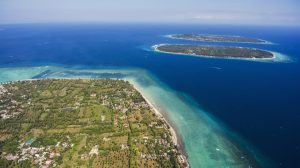Indonesian President Joko “Jokowi” Widodo has ended more than two years of speculation and announced that the name of his country’s new capital in Kalimantan will be Nusantara, an appropriate choice given the history of the region.
“Nusantaria” was a name that denoted much of Southeast Asia when it was little more than isolated sea-faring ports and sultanates dictated by trade winds as opposed to nation-states and the sovereign borders that make-up Indonesia and the ASEAN of today.
As a name it enjoyed something of a resurgence with the publication of “Empire of the Winds: The Global Role of Asia’s Great Archipelago,” by Philip Bowring in March 2019, and was then mooted in this column as a potential name for the new capital when Jokowi announced its construction would go ahead five months later.
Jokowi’s critics, who argued the new capital was simply a legacy project, had cheekily suggested “Saint Jokoberg” and “Jokograd,” while the more cerebral suggested “Mandalanusa” which loosely translates as “center of the archipelago” and was favored by many.
“I just received confirmation and direct orders from the president, namely on Friday,” National Development Planning Minister Suharso Monoarfa said during a meeting with a special committee for the establishment of the new capital. “He said the new capital is Nusantara.”
“The reason is because Nusantara has been known for a long time. And it is iconic internationally, simple and describes our archipelago, the Republic of Indonesia. I believe we all agree with the name Nusantara,” he said.
Nusantara will straddle the regions of North Penajam Paser and Kutai Kartanegara in Indonesia’s province of East Kalimantan on Borneo, and Jokowi wants the transition completed before the next election in 2024, when he must stand down following his mandated two terms as president.
The new capital has been legitimately sold as a much needed alternative to Jakarta, built on a swamp. Scientists expect nearly all of North Jakarta to be submerged by 2050. It also stands among the worst cities in the world for traffic congestion.
East Kalimantan was mandated as it sits in the middle of the Indonesian archipelago and is one of the safest locations in terms of the earthquakes, volcanic eruptions, and tsunamis that accompany the nation’s position in the Pacific Rim of Fire.
That centrality amid 17,000 islands, many of them remote and isolated, was also an important point and chosen to rein-in a Javanese-centric bureaucracy and a clan-based political ruling class with an overarching influence over 1,300 officially recognized ethnic groups.
More than $35 billion has been set aside in the state budget for the initial construction of the capital, which is expected to begin this year and includes the Special Economic Zones of Maloy Batuta Trans Kalimantan.
Among the immediate needs are homes for 1.5 million public servants and supporting infrastructure with the government expected to provide about 20 percent of that outlay and the rest to come from private investment and joint-ventures.
The site also sits amid pristine rainforests and designers want the new capital built within the rainforest itself as an ecological showcase for Indonesia.
However, a coalition of NGOs have claimed the area is already controlled by 162 mining concessions, mostly coal companies, who stand to profit from selling coal-fired electricity, a point overlooked when the original plan was announced in August, 2019.
And Indonesia’s record in protecting its rich, natural environment is far from great.
“If the government says it’s going to be the public who will benefit, that’s a big lie,” Merah Johansya, spokesman for the Mining Advocacy Network, said following the release of a report in early 2020. “The ones that will benefit are these companies.”
































